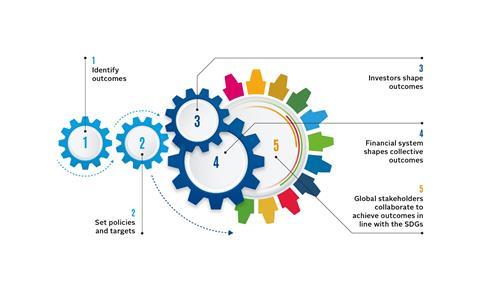By Shelagh Whitley (@shelaghwhitley), Director of ESG and SDGs, PRI and Marcel Jeucken, Managing Director, SustFin Ltd.
Every action an investor takes shapes outcomes in the real world – whether they want it to or not. As expectations – from beneficiaries and clients, government and regulators, and leadership and employees – of investors’ role in outcomes change, investors need to be ready to respond.
Issues such as climate change, human rights and economic inequality are playing an ever-increasing role in the public conversation, right across the world.
Every action an investor takes shapes outcomes in the real world – whether they want it to or not.
Climate change has moved from being something conceptual that people are concerned about to something visceral that they are angry about. The COVID-19 pandemic has brought simmering issues with how companies treat their workers to the boil, almost overnight. Underlying unease over employment structures in the gig economy have become pressing concerns. Driving a taxi or bus, providing people’s food and caring for the elderly have become jobs for which simply going to work means putting your health on the line. Workers that would be categorised as “low-skilled” in February were labelled “essential” by March.
The visibility and urgency around these issues has increased, but that does not mean that they are new or temporary or isolated; they are systemic and they are not going to be solved by through individual action alone. The influence of companies – particularly large ones – in society and on the natural environment is unmistakable to everyone involved, and by extension the role of their owners – particularly those controlling the retirement funds of the very people affected – is impossible to ignore or deny.
For years, investors have been growing their understanding of how environmental, social and governance issues in the real world affect their portfolios. Now understanding is also growing of how investors’ actions also have outcomes in the real world – along with expectations of what investors should be doing about those outcomes.
This is a key time for investors to begin building their understanding of positive and negative outcomes – and to learn how they can shape those outcomes through their investment decisions, from their stewardship of investees and from their engagement with wider stakeholders such as policy makers. As the world’s agreed goals for society and all its stakeholders, the Sustainable Development Goals (SDGs) provide a lens through which investors can align themselves with the needs of the wider world.
The PRI’s latest report Investing with SDG outcomes therefore provides a high-level framework for investors looking to shape their outcomes on the world, in line with the SDGs. It outlines five parts:
1. Identify outcomes – investors individually identify and understand the unintended outcomes from current investment activities.
2. Set policies and targets – investors individually set policies and targets for their intentional activities to shape outcomes in line with the SDGs.
3. Investors shape outcomes – investors individually seek to increase positive outcomes, decrease negative outcomes and measure progress toward established targets.
4. Financial system shapes outcomes – investors, in aggregate and collectively, seek to increase positive outcomes, decrease negative outcomes and measure collective progress.
5. Global stakeholders collaborate to achieve outcomes in line with the SDGs – investors work with broader stakeholders – including businesses, governments, academia, NGOs, consumers, citizens and the media – to globally achieve all SDGs.

For investors that choose to shape outcomes, this involves broadening the analysis of individual investees’ financially material ESG issues, to also include a parallel analysis of the most important outcomes to society and the environment at a systemic level. Investor examples described in Investing with SDG outcomes include Nomura describing an approach to tracking an investee’s contribution to reducing global HIV mortality rates by looking not just at corporate strategy and behaviour, but through monitoring the actual number of patients ultimately receiving HIV treatment in the low-/middle-income countries critical to fighting the virus.
This report is only the beginning in bringing together thinking on ESG risks and opportunities with thinking on the potential to shape outcomes. The PRI will assist signatories – including through working groups and case studies –across the framework and all investor actions: investment decisions, stewardship of investees and wider stakeholder engagement. To support reporting and disclosure, the revised PRI Reporting Framework – piloting in January 2021 – will include an initial set of questions on outcomes, and collaborate with others on harmonised sustainability performance reporting right across the industry.
Hunger is rising, half the world’s people lack basic education and essential healthcare, women face discrimination and disadvantage everywhere. One reason for the faltering progress is the lack of financing
UN Secretary General, António Guterres
This blog is written by PRI staff members and guest contributors. Our goal is to contribute to the broader debate around topical issues and to help showcase some of our research and other work that we undertake in support of our signatories.
Please note that although you can expect to find some posts here that broadly accord with the PRI’s official views, the blog authors write in their individual capacity and there is no “house view”. Nor do the views and opinions expressed on this blog constitute financial or other professional advice.
If you have any questions, please contact us at [email protected].












